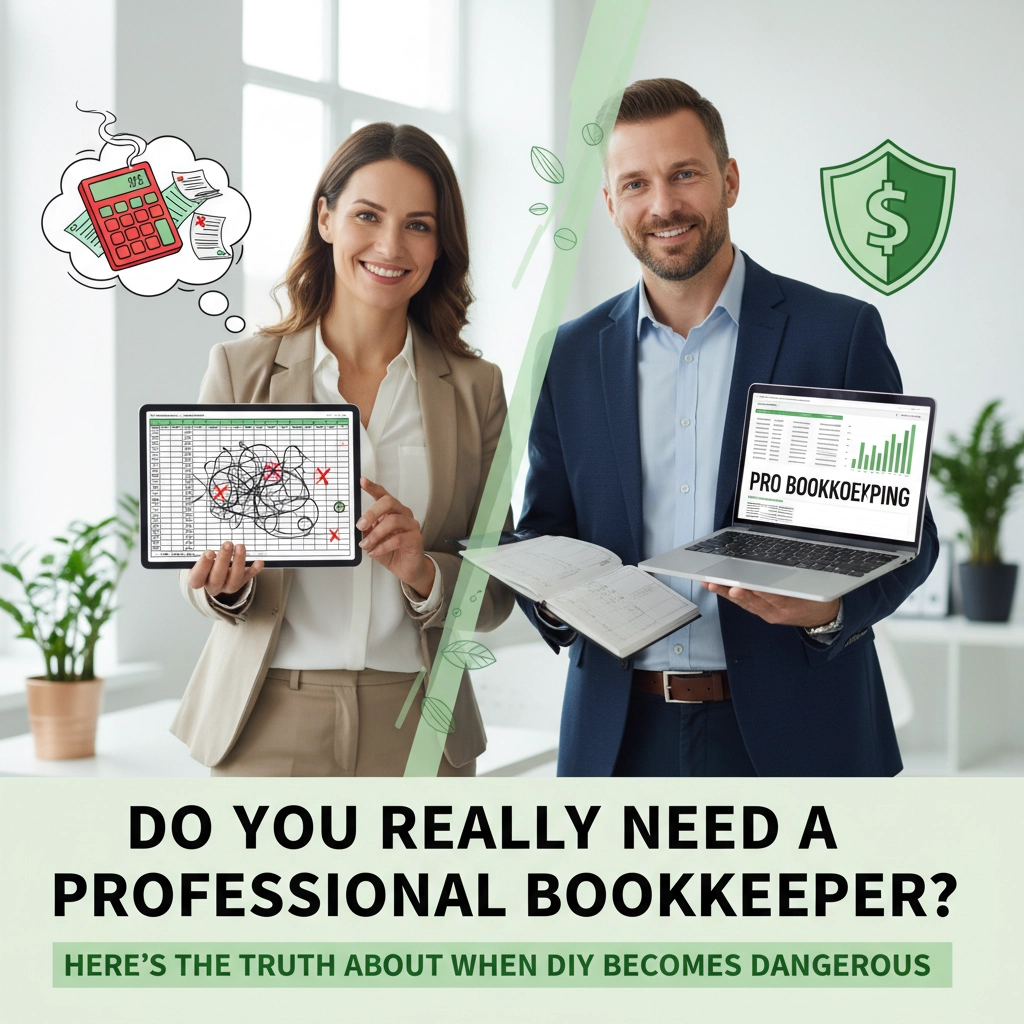Do You Really Need a Professional Bookkeeper? Here's the Truth About When DIY Becomes Dangerous

Let's cut straight to the chase: most small business owners think they're saving money by doing their own books. But here's what nobody talks about: DIY bookkeeping often costs more than hiring a pro, especially when you factor in the time, stress, and expensive mistakes that pile up.
The truth is, whether you need a professional bookkeeper depends entirely on your business complexity and how much your time is worth. But if you're asking this question, chances are your DIY approach is already becoming a problem.
The Hidden Price Tag of DIY Bookkeeping
When you crunch the numbers, professional bookkeeping typically runs $200-500 per month for most small businesses. Sounds expensive, right? But let's talk about what DIY actually costs you.
First, there's your time. If you're spending 5-10 hours a week on bookkeeping tasks (and let's be honest, it's probably more during tax season), that's time you're not spending on sales, marketing, or actually running your business. If your time is worth $50 an hour, you're already looking at $250-500 weekly just in opportunity cost.
Then there are the mistakes. One miscategorized expense, one missed deduction, or one late tax filing can cost hundreds or thousands in penalties and fees. I've seen business owners lose entire years of "savings" from a single bookkeeping error.

When DIY Becomes Genuinely Dangerous
Here are the red flags that your DIY bookkeeping is putting your business at risk:
You're Always Behind on Your Books
If you're constantly playing catch-up, reconciling three months of transactions at once, or scrambling to get organized for tax season, you've already lost control. Accurate bookkeeping requires consistency, and when you fall behind, errors multiply.
You Don't Understand What Your Reports Are Telling You
Can you look at your profit and loss statement and immediately spot problems or opportunities? Do you know which expenses are tax-deductible and which aren't? If your financial reports feel like hieroglyphics, you're missing critical business intelligence.
You're Spending Weekends on QuickBooks
When bookkeeping starts eating into your personal time regularly, that's a clear sign the task has outgrown your capacity. Your weekends should be for rest or revenue-generating activities, not reconciling bank statements.
Tax Season Gives You Panic Attacks
If preparing for taxes feels like archaeological excavation: digging through boxes of receipts and trying to piece together a year's worth of financial activity: you need professional help.
Your Business Is Growing Fast
Rapid growth is exciting, but it makes bookkeeping exponentially more complex. More transactions, more employees, more tax obligations, and more regulations to navigate. What worked when you had 10 customers won't work with 100.
When DIY Actually Makes Sense
To be fair, DIY bookkeeping can work in specific situations:
Your business is very simple with minimal transactions
You're comfortable with accounting software and understand basic bookkeeping principles
You have consistent time to dedicate to maintaining your books weekly
Your finances are straightforward with few deductions or complex transactions
Cost savings genuinely outweigh the time investment
If you're a freelancer with 10-15 clients, mostly home-based with minimal expenses, and you actually enjoy the bookkeeping process, DIY might be your sweet spot.

Clear Signs You Need Professional Help Now
Stop debating and hire a bookkeeper immediately if any of these apply:
Your Business Has Multiple Revenue Streams
Whether it's different service lines, product sales, or investment income, multiple revenue streams create complexity that's easy to mess up without proper expertise.
You Have Employees
Payroll taxes, worker classification issues, and employment law compliance are minefields for the uninitiated. The penalties for payroll mistakes are severe and swift.
You're Facing an Audit or Tax Issues
If the IRS comes knocking, you want a professional in your corner who speaks their language and understands the process.
You Can't Answer Basic Financial Questions
"What's my gross margin?" "How much did I spend on marketing last quarter?" "Am I profitable?" If these questions stump you, your bookkeeping isn't serving its primary purpose.
You're Making Important Business Decisions Based on Gut Feel
When you're considering big purchases, hiring decisions, or expansion plans without solid financial data, you're flying blind.
Making the Transition to Professional Bookkeeping
Ready to make the switch? Here's how to do it right:
Get Your Current Records Organized
Before handing things off, gather all your financial documents from the current year. Bank statements, receipts, invoices, and any bookkeeping you've done so far. The cleaner you can make the handoff, the smoother the transition.
Choose the Right Level of Service
Not all bookkeeping services are created equal. Some just categorize transactions, while others provide strategic insights and tax planning. Consider what level of support your business actually needs.
Set Clear Expectations
Discuss reporting schedules, communication preferences, and specific business needs upfront. A good bookkeeper should ask lots of questions about your business model and goals.
Plan for the Learning Curve
Even with professional help, expect a month or two of adjustment as your bookkeeper learns your business and you get used to new processes and reports.

The Real Value of Professional Bookkeeping
Here's what you actually get when you hire a professional that goes beyond just categorizing transactions:
Strategic Insights: A good bookkeeper spots trends, identifies cost-saving opportunities, and helps you understand your numbers in context.
Tax Optimization: They know which expenses are deductible, how to structure transactions for maximum tax benefits, and when to make strategic moves.
Compliance Peace of Mind: They stay current on tax law changes, filing requirements, and regulatory updates so you don't have to.
Better Decision Making: With accurate, timely financial reports, you can make informed decisions about pricing, spending, and growth opportunities.
Time Freedom: Most importantly, you get your time back to focus on what you do best: running and growing your business.
The Bottom Line
DIY bookkeeping works until it doesn't. And when it stops working, the transition to professional help becomes much more expensive and stressful than if you'd made the switch earlier.
The question isn't really whether you can do your own bookkeeping: it's whether you should. If bookkeeping is taking time away from activities that generate revenue, create stress that affects your decision-making, or create compliance risks that could cost you serious money, professional help isn't an expense: it's an investment.
Your business deserves accurate financial management, and you deserve peace of mind. Sometimes the smartest financial decision is knowing when to delegate to the experts.
If you're ready to explore professional bookkeeping services that can simplify your financial management, check out our services to see how we can help your business thrive.
